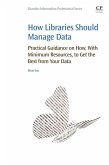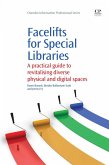Transforming Research Libraries for the Global Knowledge Society (eBook, ePUB)
Redaktion: Dewey, Barbara


Alle Infos zum eBook verschenken

Transforming Research Libraries for the Global Knowledge Society (eBook, ePUB)
Redaktion: Dewey, Barbara
- Format: ePub
- Merkliste
- Auf die Merkliste
- Bewerten Bewerten
- Teilen
- Produkt teilen
- Produkterinnerung
- Produkterinnerung

Hier können Sie sich einloggen

Bitte loggen Sie sich zunächst in Ihr Kundenkonto ein oder registrieren Sie sich bei bücher.de, um das eBook-Abo tolino select nutzen zu können.
Transforming Research Libraries for the Global Knowledge Society explores critical aspects of research library transformation needed for successful transition into the 21st century multicultural environment. The book is written by leaders in the field who have real world experience with transformational change and thought-provoking ideas for the future of research libraries, academic librarianship, research collections, and the changing nature of global scholarship within a higher education context. - Authors are leaders in the research libraries field from a variety of countries - Thought…mehr
- Geräte: eReader
- ohne Kopierschutz
- eBook Hilfe
![The Art of People Management in Libraries (eBook, ePUB) The Art of People Management in Libraries (eBook, ePUB)]() James McKinlayThe Art of People Management in Libraries (eBook, ePUB)48,95 €
James McKinlayThe Art of People Management in Libraries (eBook, ePUB)48,95 €![How Libraries Should Manage Data (eBook, ePUB) How Libraries Should Manage Data (eBook, ePUB)]() Brian CoxHow Libraries Should Manage Data (eBook, ePUB)41,95 €
Brian CoxHow Libraries Should Manage Data (eBook, ePUB)41,95 €![Facelifts for Special Libraries (eBook, ePUB) Facelifts for Special Libraries (eBook, ePUB)]() Dawn BassettFacelifts for Special Libraries (eBook, ePUB)45,95 €
Dawn BassettFacelifts for Special Libraries (eBook, ePUB)45,95 €![Quality and the Academic Library (eBook, ePUB) Quality and the Academic Library (eBook, ePUB)]() Jeremy AtkinsonQuality and the Academic Library (eBook, ePUB)41,95 €
Jeremy AtkinsonQuality and the Academic Library (eBook, ePUB)41,95 €![The English Library (eBook, ePUB) The English Library (eBook, ePUB)]() Raymond IrwinThe English Library (eBook, ePUB)29,95 €
Raymond IrwinThe English Library (eBook, ePUB)29,95 €![Transforming Serials (eBook, ePUB) Transforming Serials (eBook, ePUB)]() Transforming Serials (eBook, ePUB)49,95 €
Transforming Serials (eBook, ePUB)49,95 €![The Heritage of the English Library (eBook, ePUB) The Heritage of the English Library (eBook, ePUB)]() Raymond IrwinThe Heritage of the English Library (eBook, ePUB)29,95 €
Raymond IrwinThe Heritage of the English Library (eBook, ePUB)29,95 €-
-
-
Dieser Download kann aus rechtlichen Gründen nur mit Rechnungsadresse in A, B, BG, CY, CZ, D, DK, EW, E, FIN, F, GR, HR, H, IRL, I, LT, L, LR, M, NL, PL, P, R, S, SLO, SK ausgeliefert werden.
- Produktdetails
- Verlag: Elsevier Science & Techn.
- Seitenzahl: 208
- Erscheinungstermin: 1. September 2010
- Englisch
- ISBN-13: 9781780630380
- Artikelnr.: 40304085
- Verlag: Elsevier Science & Techn.
- Seitenzahl: 208
- Erscheinungstermin: 1. September 2010
- Englisch
- ISBN-13: 9781780630380
- Artikelnr.: 40304085
- Herstellerkennzeichnung Die Herstellerinformationen sind derzeit nicht verfügbar.
List of figures and tables
About the authors
Chapter 1: Transforming research libraries: an introduction
Introduction
Transformation from different perspectives
Relevance and effectiveness
Organizing for successful collaboration
Creation literacy: an example of the transformation journey
Knowledge creation is global
Conclusion: building to scale at the interfaces of cultures
Part 1: Framing the Twenty First-Century Research Library
Chapter 2: Advancing from Kumbaya to radical collaboration: redefining the future research library
Collaboration and innovation
Radical collaboration
Strategic leadership for preservation
Accountability and assessment
Library space and collaboration
Big science and data curation
Faculty relationships
The 2CUL Project
Conclusions
Chapter 3: Will universities still need libraries (or librarians) in 2020?
Introduction
Contours of change
What will the university's information needs be in 2020?
The 'library' in 2020
'Librarians in 2020'
Some conclusions
Chapter 4: Transforming research libraries: Piano, piano, si va lontano
Starting at the top
Leading organizational transformations
An enabling vision
Creating opportunities for others to do the right things
The acquisition of knowledge, professional networks, and partners
Transformative, collaborative priorities
The continuing involvement of the user community
Piano, piano, si va lontano: toward lasting transformations
Chapter 5: The transformation of academic libraries in China
Yesteryear's libraries
Today's libraries
Staffing: recovery
Collections and collection development
Library buildings
Summary and challenges
Part 2: Organization and the University Context
Chapter 6: Organizational and strategic alignment for academic libraries
Introduction
The strategy focused organization
Aligning strategies to performance
Strategic alignment in the academic environment
Strategic alignment for academic libraries
Organizational alignment for libraries
Organizational and strategic alignment for libraries - the leadership challenge
Acknowledgements
Chapter 7: Building key relationships with senior campus administrators
Introduction
About McMaster University
Human performance technology
Systems theory
Applying the HPT model, phase one: performance analysis
Phase two: cause analysis
Phase three: intervention (selection and implementation)
Phase four: evaluation
Conclusion
Appendix A: Interview questions
Appendix B: Focus groups
Appendix C: Web survey questions
Part 3: Partners and Collaborative Environments
Chapter 8: Partnerships and connections
Partners defined
Engaging partners
Sustaining partners
Partnering skills
Future partners
Chapter 9: Common spaces, common ground: shaping intercultural experiences in the learning commons
Impetus for change
The commons concept
The role of Web 2.0
A learning commons and 'Ready for the World'
Common Ground Book Club
The Sparky Awards
Commons World
Film discussion series
Programming for international students
Conclusion
Part 4: Creating Accessible and Enduring Scholarship
Chapter 10: New modes of scholarly communication: implications of Web 2.0 in the context of research dissemination
Introduction
Scholarly communication
Social web and interactive tools
Scholarly communication and implications of Web 2.0
Developing academic library services towards scholarly communication 2.0
List of figures and tables
About the authors
Chapter 1: Transforming research libraries: an introduction
Introduction
Transformation from different perspectives
Relevance and effectiveness
Organizing for successful collaboration
Creation literacy: an example of the transformation journey
Knowledge creation is global
Conclusion: building to scale at the interfaces of cultures
Part 1: Framing the Twenty First-Century Research Library
Chapter 2: Advancing from Kumbaya to radical collaboration: redefining the future research library
Collaboration and innovation
Radical collaboration
Strategic leadership for preservation
Accountability and assessment
Library space and collaboration
Big science and data curation
Faculty relationships
The 2CUL Project
Conclusions
Chapter 3: Will universities still need libraries (or librarians) in 2020?
Introduction
Contours of change
What will the university's information needs be in 2020?
The 'library' in 2020
'Librarians in 2020'
Some conclusions
Chapter 4: Transforming research libraries: Piano, piano, si va lontano
Starting at the top
Leading organizational transformations
An enabling vision
Creating opportunities for others to do the right things
The acquisition of knowledge, professional networks, and partners
Transformative, collaborative priorities
The continuing involvement of the user community
Piano, piano, si va lontano: toward lasting transformations
Chapter 5: The transformation of academic libraries in China
Yesteryear's libraries
Today's libraries
Staffing: recovery
Collections and collection development
Library buildings
Summary and challenges
Part 2: Organization and the University Context
Chapter 6: Organizational and strategic alignment for academic libraries
Introduction
The strategy focused organization
Aligning strategies to performance
Strategic alignment in the academic environment
Strategic alignment for academic libraries
Organizational alignment for libraries
Organizational and strategic alignment for libraries - the leadership challenge
Acknowledgements
Chapter 7: Building key relationships with senior campus administrators
Introduction
About McMaster University
Human performance technology
Systems theory
Applying the HPT model, phase one: performance analysis
Phase two: cause analysis
Phase three: intervention (selection and implementation)
Phase four: evaluation
Conclusion
Appendix A: Interview questions
Appendix B: Focus groups
Appendix C: Web survey questions
Part 3: Partners and Collaborative Environments
Chapter 8: Partnerships and connections
Partners defined
Engaging partners
Sustaining partners
Partnering skills
Future partners
Chapter 9: Common spaces, common ground: shaping intercultural experiences in the learning commons
Impetus for change
The commons concept
The role of Web 2.0
A learning commons and 'Ready for the World'
Common Ground Book Club
The Sparky Awards
Commons World
Film discussion series
Programming for international students
Conclusion
Part 4: Creating Accessible and Enduring Scholarship
Chapter 10: New modes of scholarly communication: implications of Web 2.0 in the context of research dissemination
Introduction
Scholarly communication
Social web and interactive tools
Scholarly communication and implications of Web 2.0
Developing academic library services towards scholarly communication 2.0







